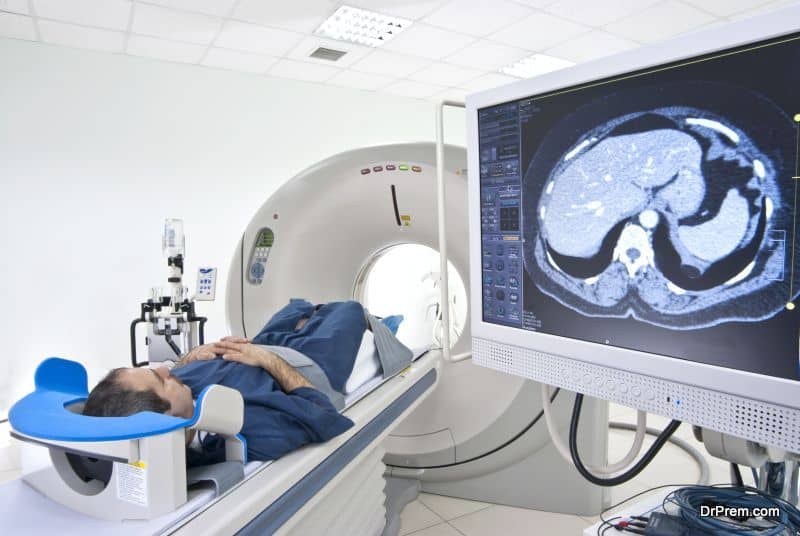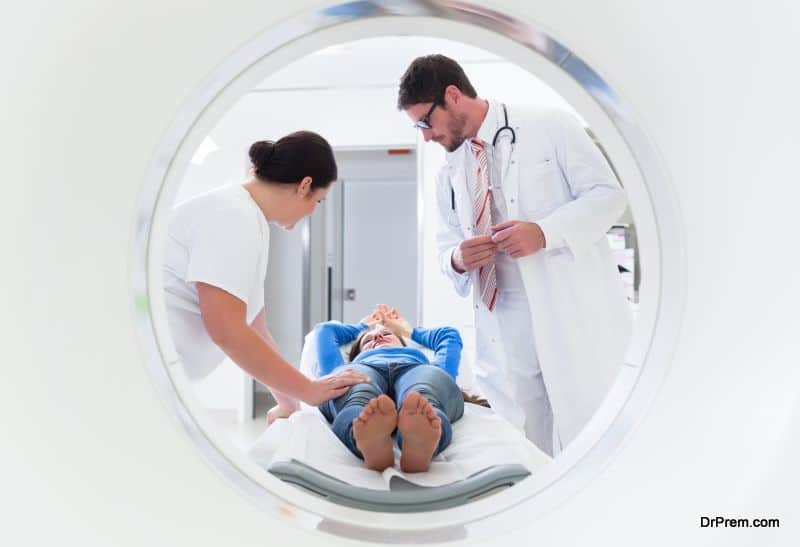When you need a detailed medical investigation of the internal organs and tissues which X-Ray and CT scan cannot reveal, Magnetic Resonance Imaging or MRI comes into play. The strong magnetic field and radio wave energy pulses involved in MRI send enhanced images of the internal organs which can be viewed through a computer screen. Doctors can assess the extent of damage or predict any underlying medical condition, which is yet to show the symptoms and take proper actions on time.
MRI scan technology in India
Both the open and closed MRI facilities are available in India – not only in metros but also in tier-II cities. The latest generation 3.0T Digital MRI machine is being used in many parts of the country that reduces the chances of image distortion, while the Silent MRI technology reduces the discomfort caused by the sound generated during the process.
The cost of this scan in India is reasonable enough varying from INR 7500 – 9500 depending upon the body part to be scanned, location of the center, number of technicians involved and the arrangements required to produce the image.
For example, the approximate costs of MRI Brain scanning procedure in Bangalore and Pune are INR 6,750-7,300 and INR 1,000-17,500.
Why MRI Scan is important?
The biggest advantage of MRI scan is that unlike X-Rays and CT scans which involve potentially harmful ionizing radiations to the patients, it does not carry any such side effects.
MRI scan has turned out to be an essential diagnostic tool for the doctors and researchers for accurate diagnosis and treatment especially in case of life threatening ailments when timely actions matter most.
When is MRI applicable?
MRI scan is done for a number of reasons. For example, locating a brain tumor, which often does not show up in an X-Ray or CT scan, or detecting the extent of injury in blood vessels caused due to stroke or accident.
MRI can be suggested to detect eye problems related to optic nerve, defects in coronary arteries and valves or any damage in the chest. This scan is also useful in detecting problems in internal organs and bones and joints as well.
Since the patient is exposed to a strong magnetic field, a preliminary evaluation of the patient by the physician/technician is mandatory before the scan.
Preparation for the test
MRI scan is safe for all. But patients with metallic implants or devices like pacemaker, artificial limbs, braces, metallic dental fillings, Intrauterine device and cochlear implants may not be deemed fit for this test.
Patients who had undergone a recent surgery in blood vessels, those wearing medicine patches and pregnant women may also not be considered fit for MRI.
The Procedure
An MRI technologist would conduct the entire process while a radiologist does the image interpretation. Often, physicians also do the required interpretation.
First of all, you need to fill a personal data form and get the due approval. You may be injected with a gladolium based fluid, which is a dye applied to develop contrast pictures helping physicians for better diagnosis and treatment plan.
You will be advised to take off most of your clothes (depending on the area to be scanned) and remove all metallic objects (including debit/credit cards) that you are carrying. You may be given a gown to wear.
You will be asked to lie down on the back on a sliding table, which is also a part of the scanning machine. It is required to remain still while the scanning is on. Therefore, your head, chest and hands would be bound with straps for restricting the free movement.
The table then slides into the cylindrical chamber (resembling a tunnel) holding the strong magnet. A particular device or a coil may be placed over a specific area of the body to be scanned. A special belt or strap is introduced to sense your breathing and heartbeat which will guide the scanner to take images at the right time.
When the scanning is on, you will feel the air from a moving fan. You may also hear certain tapping noises. The scanning process generates a loud sound and you would be given earplugs to minimize the discomfort caused by it.
While in the scanning chamber, you would be connected to the technician through intercom. The technician will watch you from a nearby window. The entire process takes 15-45 minutes or even more depending upon the medical condition.
You will not feel any pain during the process. Some may feel claustrophobic due to the confined space. You may also feel some warmth on the area which is scanned. This is normal. But if you experience breathing problems, nausea, dizziness, pain and burning sensation, immediately communicate with the technician. After the scan, you can get back to your normal activities immediately.
In view of the immense importance of MRI scan, you can unhesitatingly choose India for MRI procedure where you would definitely get the best value for money.
Article Submitted By Community Writer







